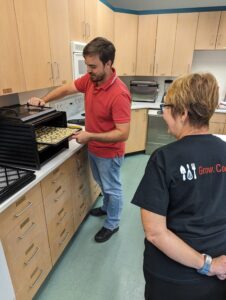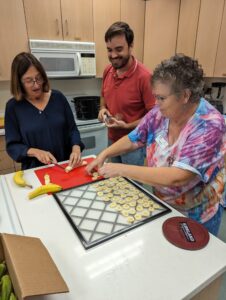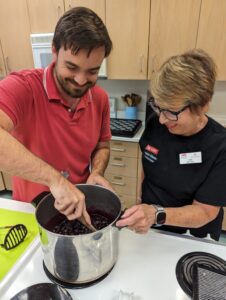Prepare for Preserving Foods
go.ncsu.edu/readext?1083896
en Español / em Português
El inglés es el idioma de control de esta página. En la medida en que haya algún conflicto entre la traducción al inglés y la traducción, el inglés prevalece.
Al hacer clic en el enlace de traducción se activa un servicio de traducción gratuito para convertir la página al español. Al igual que con cualquier traducción por Internet, la conversión no es sensible al contexto y puede que no traduzca el texto en su significado original. NC State Extension no garantiza la exactitud del texto traducido. Por favor, tenga en cuenta que algunas aplicaciones y/o servicios pueden no funcionar como se espera cuando se traducen.
Português
Inglês é o idioma de controle desta página. Na medida que haja algum conflito entre o texto original em Inglês e a tradução, o Inglês prevalece.
Ao clicar no link de tradução, um serviço gratuito de tradução será ativado para converter a página para o Português. Como em qualquer tradução pela internet, a conversão não é sensivel ao contexto e pode não ocorrer a tradução para o significado orginal. O serviço de Extensão da Carolina do Norte (NC State Extension) não garante a exatidão do texto traduzido. Por favor, observe que algumas funções ou serviços podem não funcionar como esperado após a tradução.
English
English is the controlling language of this page. To the extent there is any conflict between the English text and the translation, English controls.
Clicking on the translation link activates a free translation service to convert the page to Spanish. As with any Internet translation, the conversion is not context-sensitive and may not translate the text to its original meaning. NC State Extension does not guarantee the accuracy of the translated text. Please note that some applications and/or services may not function as expected when translated.
Collapse ▲ If preserving food is in your plans for this summer, take some time to insure you have the correct equipment and up-to-date instructions. We can help. A word of caution: make sure the recipes that you’re using are up-to-date and have been researched and tested. Food preservation recipes and techniques are constantly being studied and revised. Just because “you’ve always done it this way” or this is how your mother (or grandmother) taught you, you may not be using the most up-to-date methods. There are a lot of recipes floating around the internet that may sound good and look good, but that does not necessarily make them SAFE.
If preserving food is in your plans for this summer, take some time to insure you have the correct equipment and up-to-date instructions. We can help. A word of caution: make sure the recipes that you’re using are up-to-date and have been researched and tested. Food preservation recipes and techniques are constantly being studied and revised. Just because “you’ve always done it this way” or this is how your mother (or grandmother) taught you, you may not be using the most up-to-date methods. There are a lot of recipes floating around the internet that may sound good and look good, but that does not necessarily make them SAFE.
 The National Center for Home Food Preservation at the
The National Center for Home Food Preservation at the
University of Georgia is recognized as a reliable and research-based source of food preservation information. Their website has a wealth of information and is available through the University of Georgia. Please don’t take risks by not following tested and researched recipes.
Avery Ashley, our Family and Consumer Science Extension Agent and our Extension Master Food Volunteers here in Brunswick County will be offering a series of Food Preservation classes early this fall. These classes are for people that are brand new to preserving foods and those experienced folks that just need a refresher.
These classes include:
September 11 Pickling Sign Up Here
September 18 Jams and Jellies Sign Up Here
September 25 Dehydrating Sign Up Here October 2 Kombucha Sign Up Here October 9 Fermenting and Sauerkraut Sign Up Here
All of these classes will be held from 2-4 p.m. in the demonstration kitchen at the NC
Cooperative Extension office at the Government Center in Bolivia. The registration fee
is $10 for each class. Preregistration is required and links are above. You can attend just one class or all of them. Select the topics you’re interested in!
If you’re planning on pressure canning foods this year we can help there, too. Pressure canners are recommended when preserving all low acid foods such as vegetables, meat or fish.  To ensure that the dial gauges on pressure caners are accurate, it is recommended that they be tested yearly. We’ll be testing gauges at the Extension Office on Thursday, August 14 from 2:30 p.m. until 3:30 p.m. We offer this service free of charge. Don’t take the chance of losing all your hard work or preserving unsafe products due to an inaccurate gauge. To have it tested, bring the canner lid with the gauge attached to the Brunswick County Extension Center in Building N at the Government Center in Bolivia. It only takes a few minutes for the peace of mind knowing your gauge is accurate.
To ensure that the dial gauges on pressure caners are accurate, it is recommended that they be tested yearly. We’ll be testing gauges at the Extension Office on Thursday, August 14 from 2:30 p.m. until 3:30 p.m. We offer this service free of charge. Don’t take the chance of losing all your hard work or preserving unsafe products due to an inaccurate gauge. To have it tested, bring the canner lid with the gauge attached to the Brunswick County Extension Center in Building N at the Government Center in Bolivia. It only takes a few minutes for the peace of mind knowing your gauge is accurate.
If this time is not good for you, drop your canner lid off at the Extension Center prior to the testing time and then pick up after the testing is completed. We will also test canner gauges by appointment, just call and ask! Please note: we are only able to test canners made by the Presto company and their associated brands. Weighted gauges do not need to be tested.
If you have a specific question about food preservation, don’t hesitate to contact Avery Ashley at our office. For more information on these upcoming food preservation classes, you can reach out to our office for details and to register.
Syracuse is a Family and Consumer Science team member and can be reached at NC
Cooperative Extension, Brunswick County Center 910-253-2610 or by email at
clsyracu@ncsu.edu



